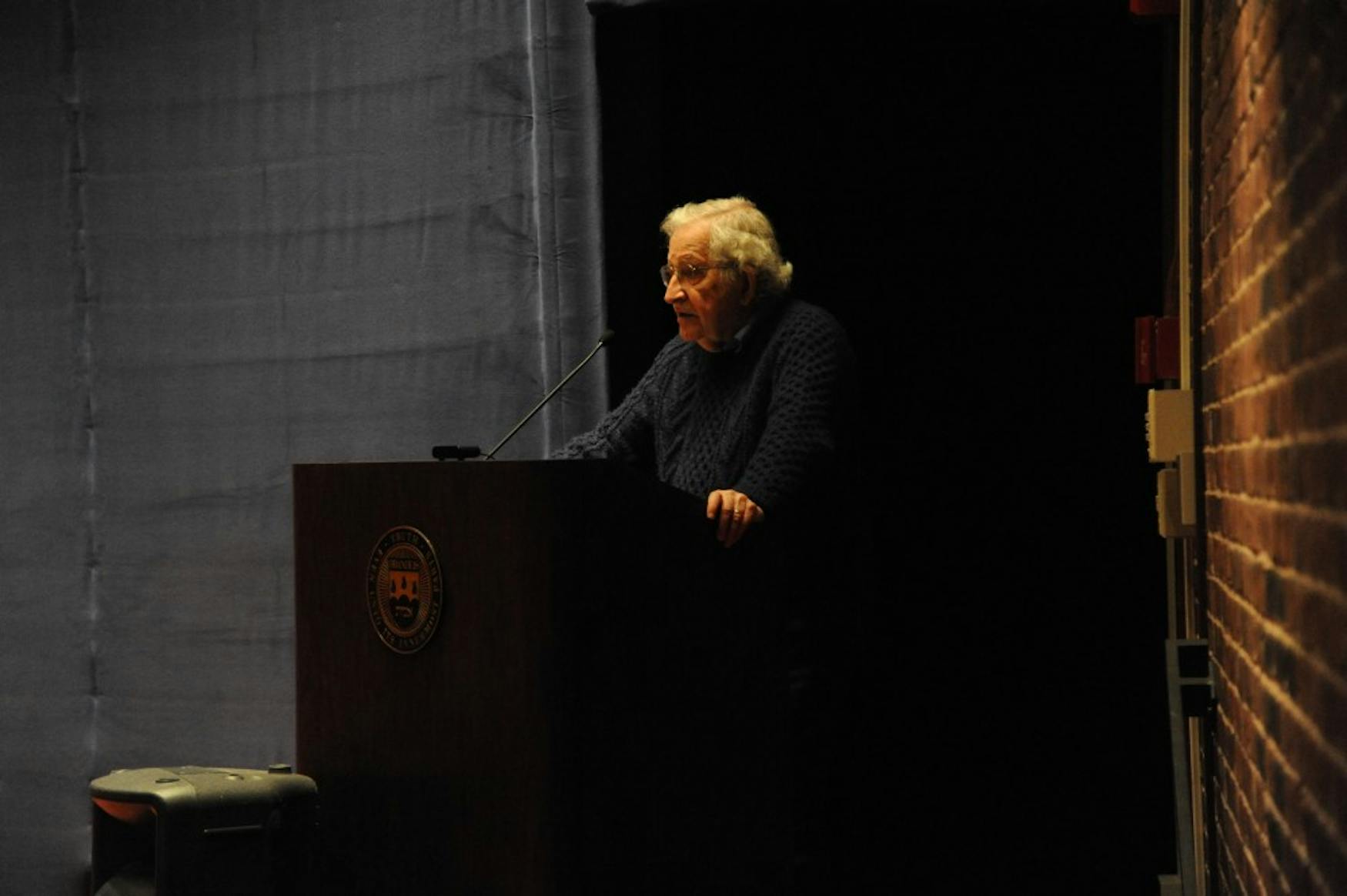Chomsky gives lecture on current and past foreign political issues
Noam Chomsky, considered to be one of the most prominent public intellectuals in the world, spoke at the University on Thursday in a lecture titled “Activism from Vietnam to Palestine.”
Chomsky is a well-known linguist, philosopher, political commentator and political and social justice activist.
Currently, Chomsky is an outspoken critic of U.S. foreign policy. He was voted the world’s leading public intellectual in a 2005 poll, according to Prof. Gordon Fellman (SOC), who gave the introduction for the event.
Chomsky began his lecture by talking about the Israeli-Palestinian conflict in reverse-chronological order.
Chomsky discussed the Human Rights Watch’s latest report on Israel, released on April 13, which addressed what the report describes as the illegal use of Palestinian children for agricultural labor in illegal Israeli settlements.
He noted that this information has not received coverage in the American press. In reaction to this, Chomsky said that in his opinion, individuals need to make value judgments on current American policies.
“Should we be concerned that we are providing support for [Israeli policies]?” Chomsky said. “Should we be concerned that the press is keeping this quiet?” Chomsky said that “Israel used to be one of the most admired countries in the world,” but now, according to Chomsky, it is “one of the most feared and hated countries in the world,” with the U.S. as its most supportive ally.
Chomsky said that this is not due to an increase in anti-Semitism but is a reaction to Israeli policies toward Palestine, which he described as “vicious, brutal and criminal.”
He went on to discuss Israel’s recent history, starting with what he described as the turning point for Israeli support and policy change—in fall 1971 when Israel “chose expansion over security” by “continuing to occupy illegal territory” when they rejected a proposed peace treaty from Egypt.
The United States backed Israel’s decision, and Chomsky says that this “fateful decision by Israel” is “what directly led” to 1973’s Yom Kippur War.
Moving forward, Chomsky told the audience, Israel’s foreign policy decisions and the “catastrophe of American diplomacy” have only gotten worse, creating a “pattern of violence.” He addressed Israeli actions toward Gaza starting in 2005 and leading up to the conflict in Gaza last summer, as well as the “illegal occupation of territories” that he says Israel “is alone in denying.”
Chomsky then discussed the similarities and differences between Israel and South Africa during apartheid. Chomsky stated that the analogy of apartheid in South Africa and apartheid in Israel today is “not accurate.”
However, he said the “crucial similarity” between Israel and South Africa is the strong U.S. support for both. Chomsky said that just as the U.S. supports Israeli policies today, they also supported South African policies during apartheid for many years, “despite the protest movements that arose” against this under the Reagan administration.
Chomsky then discussed Vietnam and moved his focus to the rise of protest movements and how they affected U.S. policy.
Chomsky chronicled the rise of protests in 1965 when South Vietnam was attacked by U.S. troops, including the International Day of Protest held in October of that year, and a second International Day of Protest held in 1966. Chomsky said that it wasn’t until 1967, however, that a “substantial protest movement developed” alongside the resistance movement as people refused to join the war.
In 1968, Chomsky said that support for the war diminished even further and more protests arose. According to Chomsky, President Johnson wanted to send more troops to Vietnam but was advised against it so that there would be troops still present in the U.S. to control the civil unrest and protests that might potentially “get out of hand.”
Following the war, Chomsky said that statistics showed that two thirds of the American population said that the war was not only a “mistake,” but was “fundamentally wrong and immoral.”
In 1981, President Reagan was dissuaded from invading Central America due to “immediate public uproar” at the decision. This, Chomsky said, shows “the contribution of activism” to U.S. politics.
Finally, Chomsky addressed recent foreign conflicts, including the 1999 East Timor conflict, the 2003 invasion of Iraq and, again, the current U.S. support of Israel.
In discussing the invasion of Iraq, which Chomsky described as “the worst crime of this millennia,” he said that the nature of activism was changing; this time, Chomsky said, public protests began before the actual invasion, indicating the growing strength and power of activism.
Regarding Israel, Chomsky concluded by saying that the U.S. policy toward the Middle East and backing for Israeli policies will probably not change “without substantial activism” taking place.
The event was sponsored by the Sociology department, the Peace, Conflict and Coexistence Studies program and the Social Justice and Social Policy program.



Please note All comments are eligible for publication in The Justice.